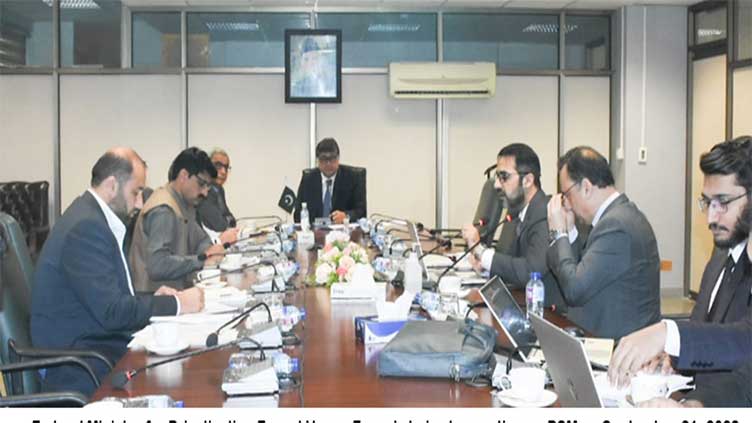27 national institutions to be privatised in future: report

Business
These institutions belong to energy, real estate, financial, industrial and aviation sectors
LAHORE (Dunya Investigation Cell) – Around 27 national institutions will be privatised in the future. Of which 14 national institutions are related to energy, four national institutions from the real estate sector,4 from the financial sector, four from the industrial sector and one national institution related to the aviation sector will be privatised, according to the Ministry of Privatisation.
The documents issued by the Ministry of Privatisation informed that Services International Hotel Lahore, Jinnah Convention Center (GCC) Islamabad, Roosevelt Hotel of Pakistan International Airlines and assets under the influence of the federal government would be privatised from the real estate sector.
In the aviation sector, the privatisation of Pakistan International Airlines (PIA) is under consideration. The financial sector includes State Life Insurance, Housing Building Finance Corporation (HBFC), Pakistan Reinsurance Company Limited and First Women Bank Limited (FWBL).
The industrial sector includes privatisation of Pakistan Steel Mills Corporation (PSMC), Heavy Electrical Complex (HEC), Sindh Engineering Limited and Pakistan Engineering Company.
Similarly, if we talk about the energy sector, 1223MW Baloki Power Plant, 1230MW Haveli Bahadur Power Plant, 747MW Guddu Power Plant and 425MW Nandipur Power Plant will be privatised while government-owned electricity sector will also be privatised. The distributor discos include Faisalabad Electric Supply Company Limited (FESCO), Islamabad Electric Supply Company (ISCO), Lahore Electric Supply Company (LESCO), Gujranwala Electric Power Company Limited (GAPCO), Multan Electric Power Company Limited (MAPCO). It has also been decided to privatise Peshawar Electric Supply Company Limited (PESCO), Hyderabad Electric Supply Company Limited (HESCO), Quetta Electric Supply Company Limited (CASCO), Sukkur Electric Power Company (SEPCO) and Tribal Areas Electric Supply Company (TESCO).
According to the annual report issued by the Ministry of Privatisation at the end of the last financial year, the process of privatisation of 1223MW Baloki Power Plant and 1230MW Haveli Bahadur Power Plant under National Power Parks Management Company Limited is in progress.
Similarly, Pakistan Steel Mills Corporation (PSMC), Heavy Electrical Complex (HEC), Services International Hotel Lahore, Jinnah Convention Center (GCC), Housing Building Finance Company Limited (HBFCL), First Women Bank Limited (FWBL) and Pakistan Reinsurance Company Limited (PRCL) privitisation is in progress.
In addition to that eight electricity distributor DISCOs on behalf of the Ministry of Privatisation, Faisalabad Electric Supply Company Limited (Fesco), Islamabad Electric Supply Company (ISCO), Lahore Electric Supply Company (LESCO) and Gujranwala Electric Power Company Limited (GAPCO) are included.
In the process of privatisation, Multan Electric Power Company Limited (MAPCO), Peshawar Electric Supply Company Limited (PESCO), Hyderabad Electric Supply Company Limited (HESCO) and Sukkur Electric Power Company (SEPCO) will be privitised under Concession Model while Quetta Electric Supply Company Limited (CASCO) and Tribal Areas Electric Supply Company (TESCO) will be liquadate under Management Contract Model.
It should be remembered that from January 1991 to June 2022, 178 government institutions have been privatised. While Rs649.11billion were accumulated in the treasury of the government of Pakistan from the privatisation of these 178 government institutions.
From 1991 until now, the privatisation of government institutions related to the banking sector is Rs41. 23 billion while Rs303.5 billion from the capital market transaction, Rs54.3 billion from the energy sector, telecommunication, 187.24 billion from the other sectors, Rs1.10 billion from the automobile sector, Rs16. 2. billion from the cement sector, Rs1.43 billion from the privatisation of the chemical sector, Rs18 billion rupees from the privatisation of the engineering sector, Rs40.3 billion from privatisation of fertiliser sector, Rs842 million rupees from privatisation of government factories related to edible oil, from rice related factories Rs230.6 million, Rs910 million from privatisation of government bread plants, Rs370 million from privatisation of textile sector, Rs270 million from privatisation of government newspapers, Rs1.80 billion from privatisation of government institutions related to tourism,Rs140 million from the privatisation of government properties were desposited into the national exchequre while Rs150 million have added to the national treasury from the privatisation of other government institutions.
It should be remembered that on January 22, 1991, the Privatisation Commission was established. On September 28, 2000, the commission was converted into a corporate body under the Privatisation Commission Ordinance 2000 to further strengthening the legitimacy of the commission. Since August 4, 2017, the commission has been functioning under the Ministry of Privatisation under the federal government.
In 2019, the commission decided to privatise 49 national institutions over a period of five years, but during this period only six national assets related to the real sector were auctioned for Rs14.14 million.
According to a decision, the privatisation process was to be carried out in two phases by the commission.
In the first phase, 29 national institutions were planned to be privatised and in the second phase, 20 national institutions were planned to be privatised.
Additionally, in the first phase, 16 from the energy sector, five from the financial sector, four from the real asset sector and four from the industrial sector, four national institutions have to be executed by the commission.

